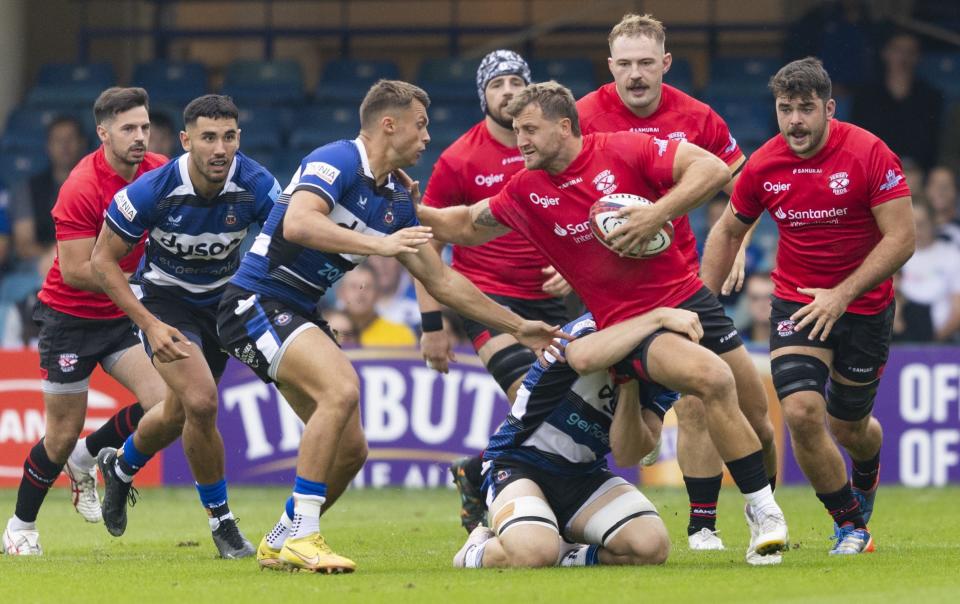
English rugby union is at war after Jersey Reds, last season’s Championship winners, became the fourth team in a year to be plunged into financial disarray after it ceased trading.
At the start of another day of sorrow and finger-pointing across the sport, Jersey staff were told that their salaries could not be paid for September and that liquidation seemed inevitable. In response, the Rugby Football Union criticised the timing of their investors’ withdrawal as “extremely disappointing”.
Senior sources within English rugby union labelled the developments on the Channel Island as a “bolt from the blue” and Rob Webber, the Jersey head coach, articulated the internal confusion in a post on X in which he wrote “we were led to believe we were in a position of strength”.
Later on Thursday, though, Simon Halliday, the chairman of the Championship clubs, insisted that the RFU had been “repeatedly warned” that the Jersey government was concerned about the second tier’s lack of robust financial support.

The back-and-forth could come to a head on Friday during what could be an explosive meeting of the RFU Council as powerbrokers discuss the new professional game agreement (PGA), and specifically future plans for the second tier.
In their own statement on Thursday morning, Jersey explained that they had ceased to trade the previous evening and took aim at ongoing uncertainty surrounding the structuring of the game in England.
“We had been able to start the season and maintain sufficient funds to cover the summer, but regret that our conversations with potential new investors as well as existing ones have been unsuccessful,” said Jersey chairman Mark Morgan.
“At one stage at the end of last season it appeared there was a viable way forward for the second tier once the new professional game agreement (PGA) was implemented from summer 2024, but Championship clubs have been left in the dark since that point and this led to a growing fatigue among those who may have invested, but could not be given any concrete assurance about when the new structure would come in, or how it would be funded.”
Jersey players were informed of their club’s plight at a 7.30am meeting. Within hours, they were being offered to other professional teams, in scenes grimly reminiscent of those at Worcester Warriors, Wasps and London Irish over the past 12 months.
Club had hoped to push for promotion
Last season, Jersey held off Ealing Trailfinders to top the Championship table. While they could not win promotion to the Premiership for this season because their facilities did not meet the competition’s minimum standards criteria, the achievement was still a significant one for a club that has progressed over the past decade under the stewardship of Harvey Biljon, their director of rugby.
The club landed a statement result at the start of this campaign by beating Bath 34-10 in the Premiership Rugby Cup, but have now had to cancel Friday’s fixture against Cornish Pirates in that competition. It is understood that the RFU, via its financial viability group, will determine the next steps with regard to Jersey’s insolvency over the coming days. The governing body has already voiced its frustration at the situation.
“It is extremely disappointing that investors would take decisions at this early point in the season to place the club in such a position,” read a statement from the RFU on Thursday.
“Championship clubs had clear confirmation from the RFU on funding for the 2023-24 season and we have been working with the Championship and Premiership Rugby on the new professional game partnership and shape of Premiership 2 with funding levels to be confirmed at the end of this calendar year. The Championship has been fully involved in these discussions since February which are aimed at stabilising and strengthening the professional game.
“This news will clearly impact the season for the Championship league and Premiership Rugby Cup competition, which was introduced this season as a way to offer a new format to supporters, bringing with it the experience of playing Premiership sides and the opportunity to welcome new fans into Championship clubs and assist them to grow new audiences. Further information on the impact of this to the Premiership Rugby Cup and Championship league season will follow.”
Halliday’s open letter referred to Jersey’s situation as a “tragedy” and a “disaster”.
“Anyone who loves rugby should listen very carefully to the message being sent by the investors in Jersey Reds, through their decision to withdraw support, about the funding of the crucial second tier of the game,” it read.
“The message is that persistent uncertainty over central financial support has made it impossible for them to carry on. In essence, they have said: if the governing body won’t commit to you, why should we? The owners of and investors in all the Championship clubs have indeed taken note.
“The Rugby Football Union has been repeatedly warned that the government of the island of Jersey was concerned at the lack of financial commitment to the league in which the Reds played.
“The Championship’s owners and investors will also have also noted that the Rugby Football Union’s response to this tragedy was to issue a statement blaming the investors in Jersey Reds and which includes the claim that the Championship has been “fully informed” of ongoing financial discussions about the future of the professional game.”
Halliday promised that owners and investors of the Championship clubs “will have more to say on this point and other aspects of today’s disastrous developments after the meeting of the RFU Council.”
‘Premiership 2’, essentially the revamped second tier of professional rugby in England, is viewed as a vital pillar of professional game agreement negotiations. It is understood that mooted proposals have included fluid promotion and relegation between ‘Premiership 1’ and ‘Premiership 2’, Thursday night fixtures to bolster any offering to broadcasters and maximum squad sizes across the two divisions to stop players being stockpiled.
In 2022, Jersey separated the amateur arm of the club from its professional one in order to safeguard the organisation, a move that Morgan believes has been vindicated. Jersey RFC are currently top of Regional 2 South Central, a sixth-tier league that features sides such as Guildford and, ironically, London Irish Wild Geese.
“There are a large number of players, coaches and other members of staff who have made huge contributions to the club in recent seasons, and we regret the massive effect this will have on all of them – it’s a very sad day,” Morgan said.
Jersey’s fate puts spotlight on RFU’s planned changes
The plight of Jersey, described by one senior source as “a bolt from the blue”, seems to have blindsided everyone and follows the unravelling of Worcester Warriors, Wasps and London Irish last season. It comes amid huge friction within the English game and its timing, on the eve of what is expected to be a fiery meeting of the Rugby Football Union’s council on Friday, is fascinating.
Jersey topped the Championship last season and, despite standards criteria denying them promotion to the Premiership, were optimistic about pushing on. A fortnight ago, Harvey Biljon’s side even thrashed Bath at The Rec in the Premiership Rugby Cup to underline their potential. That win can now be used to demonstrate the qualities of hapless players who have been thrust into the job market.
As we have had to become used to, these situations have horrible human costs. On a broader scale, they also hold a mirror up to governance. This is hardly likely to dissuade anybody calling for Bill Sweeney and Tom Ilube to leave their respective roles as chief executive and chairman of the RFU.
Championship clubs had needed to deal with decreased funding from the RFU since 2020. Before this development, it appeared as though many had cut their cloth accordingly. It made the exploits of Ealing Trailfinders, Coventry and Bedford Blues more impressive because they seemed to be building in a sustainable manner – or as sustainably as a professional rugby union team can, and more sustainably than Premiership outfits that have more support from central revenues. Jersey’s apparently inevitable liquidation indicates that they have overreached as well.
The club’s statement on Thursday morning blamed ongoing uncertainty over league structure. It is understood that a pillar of the new professional game agreement will be a strong second tier, probably ringfenced from divisions below that. The third tier would therefore be separated as the top of the community game.
Spots in the second tier, provisionally labelled as ‘Premiership 2’, would go out to tender, which has been seen as the way back for Worcester, Wasps and London Irish. Theoretically, of course, Jersey could return via that avenue, too. The competition, with more fluid promotion and relegation to and from ‘Premiership 1’, would ideally feature established clubs as well as phoenix franchises.
It has been suggested that ‘Premiership 2’ could bolster the offering for a broadcast agreement with games staged on Thursday nights, following the example of Pro D2 in France. There have been noises about maximum squad sizes in ‘Premiership 1’ and ‘Premiership 2’, as well, which would spread talent and stop top teams from stockpiling players.
In short, there does seem to be a desire to covet the second tier and achieve safety in numbers. Jersey’s fate, though, complicates a landscape that is already fraught.
Article courtesy of
Source link